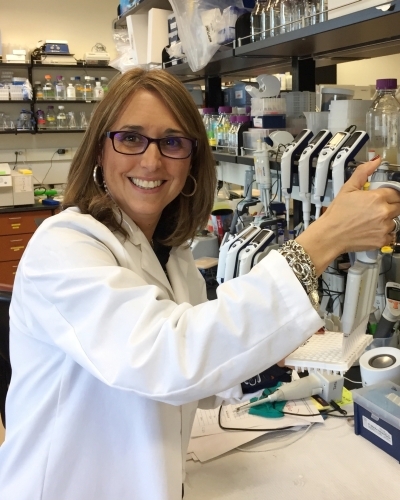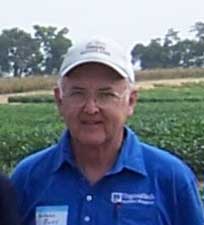Soybean Breeding
Dr. Bo Zhang’s group develops elite soybean varieties adapted to mid-Atlantic region using both classical and molecular breeding methodologies. The breeding objectives are:
• Develop new and improved, herbicide tolerant and conventional soybean varieties adapted to various production systems in Virginia and mid-Atlantic region in a steady flow,
• Incorporate value-added traits to specialty soybeans to reinforce VA soybean growers’ competitive ability in various market,
• Develop diverse soybean germplasm in yield, maturity, pest resistance, stress tolerance, value added traits, etc. to broad genetic background of soybean,
• Utilize molecular techniques to modify seed compositions for seed quality improvement.
• Development of Improved Soybean Varieties and Germplasm Adapted to Virginia
Climate change and unexpected weather make it more difficult for farmers to predict yield and yearly income because of the highly variable response of currently available varieties and hybrids. Soybean varieties specifically bred, developed, and selected by breeders for Virginia will perform better under Virginia ever-changing weather conditions. The Virginia Tech breeding program will continue the emphasis of the following breeding objectives: 1) GE; 2) desired fatty acids (FA) profile; and 3) early maturity in the next five years.
• Development of Genetically Engineered Soybean Varieties and Germplasm with High Protein Digestibility
Soybean meal has been widely used in animal feed including swine, poultry, cattle, horse, sheep and even fish. However, soybean has several anti-nutritional factors to prevent animals’ protein digestibility such as tryspin inhibitors, phytic acid, raffinose family of oligosaccharides, and antigenic factors. Virginia Tech soybean breeding program has elite low phytate and low raffinose family of oligosaccharides, genetically engineered soybean breeding lines. Incorporating low trypsin inhibitor trait into our elite breeding lines will provide Virginia and mid-Atlantic soybean producers and meal processors, and east coast animal producers an ideal feed source made from producer-friendly varieties.
• Release Public, Roundup Ready Soybean Varieties
Monsanto’s Roundup Ready (RR) soybean patent comes off in 2015. Farmers don’t have to pay technology fee on private RR soybeans, but have to sign a license agreement with seed companies not to save seeds. With public released RR soybeans, farmers can save seeds and replant them. The Virginia Tech breeding program currently has advanced RR breeding lines with great yield potential that are bred and selected in Virginia. The collaboration with Dr. Hillary Mehl (Plant pathologist at PPWS, Tidewater AREC) help us to select RR varieties with disease resistance package and provide disease resistance information of released varieties. We are in the progress of releasing RR varieties.
• Improving Quality and Yield of Specialty Soybeans
This project is to develop high quality food-grade and other niche market soybean varieties adapted to Virginia and nearby production areas. Target soyfoods are natto and soybean sprouts using small-seeded soybeans as well as tofu and soy milk using large-seeded soybeans. MFS and MFL series varieties have been released.
• Breeding for Drought-Tolerance in the Soybean Super Organism (collaboration)
Traditional and genetic techniques, along with the recent explosion in new generation sequencing and cloning technologies have fueled large increases in soybean yields, catapulting soybean into a position as a key cog in the world economy. However, the full utilization of the soybean superorganism (soy genome and its associated microbial genomes) is still in the early stages of development. An increased recognition of the heritability of the diversity bacteria and fungi associated with soybean indicate the potential for new approaches to breeding that include the full genetic potential within the soybean-microbial super-organism. The goal of this proposal is to develop drought-tolerant soybean varieties that are supported by a drought resistant and symbiotic microbial community; and with an eye on the long-term goal of supporting a new breeding paradigmthat sustains high yielding, adaptable, and resilient soybean super-organisms.
• Enhancing Protein Compoisition In Soybeans For Improving Tofu Quality Using A3 As A Marker (collaboration)
The food-grade soybean market is growing rapidly and this necessitates the breeding and production of high-quality specialty soybean that possess high protein content and unique protein composition to compete in the international market. Tofu is one of the most popular soyfood in the world, and tofu’s texture is the most important characteristic. The content of A3 peptide, which is present in the glycinin subunit of A3B4, has been proven to be strongly, quantitatively related the firmness of tofu products in our laboratory. However, it is unknown if environment affects A3 peptide content, causing tofu quality is affected by seed production environment even if the same variety is processed to make tofu. The objective of this study is to investigate the effect of production environment on the performance of the soybean lines containing various A3 peptide concentrations in multiple US locations to further sustain this structure-functional relationship.
Historical conventional variety releases from the soybean breeding program include 'Essex', 'Hutcheson' and 'Teejay'. Food-grade variety releases for natto, tofu and other uses include 'MFL-159', 'MFS-511', 'MFS-591', 'MFS-553'. The most recent releases are MFS-561 (food-grade, MG 5.6), V09-0610 (STS, MG 4.8), V10-0262 (Conv., MG 5.6), V11- 3485 (RR, MG 5.3) and V12-0045R2 (RR2Y, MG 5.3).
Presently, the Virginia Tech Soybean Breeding program has germplasm with enhanced attributes and different maturity groups available for testing and under consideration for release. Traits include high oleic acid, low linolenic acid, high meal protein, high sucrose, and low trypsin inhibitor as well as specialty soybeans for soyfood industry including soy milk, tofu, edamame, natto and soybean sprouts.
To request seed for research and testing, and information on partnering with the VT Soybean Breeding Program, e-mail Dr. Bo Zhang @ bozhang@vt.edu





Jun Qin
Visiting Scientist

Andy Jensen
Field Technician
Dr. Bo Zhang’s group develops elite soybean varieties adapted to mid-Atlantic region using both classical and molecular breeding methodologies. The breeding objectives are:
• Develop new and improved, herbicide tolerant and conventional soybean varieties adapted to various production systems in Virginia and mid-Atlantic region in a steady flow,
• Incorporate value-added traits to specialty soybeans to reinforce VA soybean growers’ competitive ability in various market,
• Develop diverse soybean germplasm in yield, maturity, pest resistance, stress tolerance, value added traits, etc. to broad genetic background of soybean,
• Utilize molecular techniques to modify seed compositions for seed quality improvement.
• Development of Improved Soybean Varieties and Germplasm Adapted to Virginia
Climate change and unexpected weather make it more difficult for farmers to predict yield and yearly income because of the highly variable response of currently available varieties and hybrids. Soybean varieties specifically bred, developed, and selected by breeders for Virginia will perform better under Virginia ever-changing weather conditions. The Virginia Tech breeding program will continue the emphasis of the following breeding objectives: 1) GE; 2) desired fatty acids (FA) profile; and 3) early maturity in the next five years.
• Development of Genetically Engineered Soybean Varieties and Germplasm with High Protein Digestibility
Soybean meal has been widely used in animal feed including swine, poultry, cattle, horse, sheep and even fish. However, soybean has several anti-nutritional factors to prevent animals’ protein digestibility such as tryspin inhibitors, phytic acid, raffinose family of oligosaccharides, and antigenic factors. Virginia Tech soybean breeding program has elite low phytate and low raffinose family of oligosaccharides, genetically engineered soybean breeding lines. Incorporating low trypsin inhibitor trait into our elite breeding lines will provide Virginia and mid-Atlantic soybean producers and meal processors, and east coast animal producers an ideal feed source made from producer-friendly varieties.
• Release Public, Roundup Ready Soybean Varieties
Monsanto’s Roundup Ready (RR) soybean patent comes off in 2015. Farmers don’t have to pay technology fee on private RR soybeans, but have to sign a license agreement with seed companies not to save seeds. With public released RR soybeans, farmers can save seeds and replant them. The Virginia Tech breeding program currently has advanced RR breeding lines with great yield potential that are bred and selected in Virginia. The collaboration with Dr. Hillary Mehl (Plant pathologist at PPWS, Tidewater AREC) help us to select RR varieties with disease resistance package and provide disease resistance information of released varieties. We are in the progress of releasing RR varieties.
• Improving Quality and Yield of Specialty Soybeans
This project is to develop high quality food-grade and other niche market soybean varieties adapted to Virginia and nearby production areas. Target soyfoods are natto and soybean sprouts using small-seeded soybeans as well as tofu and soy milk using large-seeded soybeans. MFS and MFL series varieties have been released.
• Breeding for Drought-Tolerance in the Soybean Super Organism (collaboration)
Traditional and genetic techniques, along with the recent explosion in new generation sequencing and cloning technologies have fueled large increases in soybean yields, catapulting soybean into a position as a key cog in the world economy. However, the full utilization of the soybean superorganism (soy genome and its associated microbial genomes) is still in the early stages of development. An increased recognition of the heritability of the diversity bacteria and fungi associated with soybean indicate the potential for new approaches to breeding that include the full genetic potential within the soybean-microbial super-organism. The goal of this proposal is to develop drought-tolerant soybean varieties that are supported by a drought resistant and symbiotic microbial community; and with an eye on the long-term goal of supporting a new breeding paradigmthat sustains high yielding, adaptable, and resilient soybean super-organisms.
• Enhancing Protein Compoisition In Soybeans For Improving Tofu Quality Using A3 As A Marker (collaboration)
The food-grade soybean market is growing rapidly and this necessitates the breeding and production of high-quality specialty soybean that possess high protein content and unique protein composition to compete in the international market. Tofu is one of the most popular soyfood in the world, and tofu’s texture is the most important characteristic. The content of A3 peptide, which is present in the glycinin subunit of A3B4, has been proven to be strongly, quantitatively related the firmness of tofu products in our laboratory. However, it is unknown if environment affects A3 peptide content, causing tofu quality is affected by seed production environment even if the same variety is processed to make tofu. The objective of this study is to investigate the effect of production environment on the performance of the soybean lines containing various A3 peptide concentrations in multiple US locations to further sustain this structure-functional relationship.
Historical conventional variety releases from the soybean breeding program include 'Essex', 'Hutcheson' and 'Teejay'. Food-grade variety releases for natto, tofu and other uses include 'MFL-159', 'MFS-511', 'MFS-591', 'MFS-553'. The most recent releases are MFS-561 (food-grade, MG 5.6), V09-0610 (STS, MG 4.8), V10-0262 (Conv., MG 5.6), V11- 3485 (RR, MG 5.3) and V12-0045R2 (RR2Y, MG 5.3).
Presently, the Virginia Tech Soybean Breeding program has germplasm with enhanced attributes and different maturity groups available for testing and under consideration for release. Traits include high oleic acid, low linolenic acid, high meal protein, high sucrose, and low trypsin inhibitor as well as specialty soybeans for soyfood industry including soy milk, tofu, edamame, natto and soybean sprouts.
To request seed for research and testing, and information on partnering with the VT Soybean Breeding Program, e-mail Dr. Bo Zhang @ bozhang@vt.edu





Jun Qin
Visiting Scientist

Andy Jensen
Field Technician
Dr. Bo Zhang
Research Assistant Professor


















